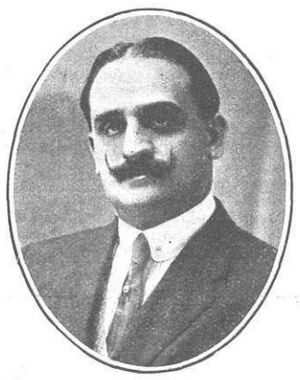Antonio Goicoechea facts for kids
Antonio Goicoechea (born on January 21, 1876, in Barcelona and died on February 11, 1953, in Madrid) was an important politician and lawyer in Spain. He lived during a time of big changes in Spain, including the Second Spanish Republic and the Spanish Civil War. Goicoechea believed in a type of government called a monarchy, where a king or queen rules. He supported the return of the Spanish royal family to power.
He first became well-known as a leader of a youth group called the Juventudes Mauristas. Later, he served as the Minister of the Interior from April 15, 1919, to July 20, 1919. This was a very important job in the government, like being in charge of national security and public services. He was part of a government led by Antonio Maura.
Goicoechea also led a political party called Renovación Española. This party believed in a strong government and traditional values.
Contents
Early Life and Career
Antonio Goicoechea was born in Barcelona, a large city in Spain. He studied law and became a lawyer. This background helped him understand laws and government, which was useful for his political career.
He joined politics and quickly became a leader. His early work with the Juventudes Mauristas showed his skills in organizing and leading people. This experience helped him rise in the political world.
Political Roles and Influence
Goicoechea held several important positions throughout his life. His time as Minister of the Interior was a key part of his career. In this role, he helped manage the country's internal affairs.
After his time as minister, he continued to be an active political figure. He founded and led the Renovación Española party. This party aimed to bring back the monarchy and promote conservative ideas in Spain.
International Discussions
Before the Spanish Civil War started, Goicoechea was involved in some important discussions. In 1934, he talked with Benito Mussolini, who was the leader of Italy at the time. These talks were about getting support for their political groups in Spain. He hoped to get help if there were big conflicts in Spain.
However, when the Civil War began in 1936, it started differently than expected. It was mainly started by a group of army officers. Because of this, Goicoechea's specific agreement with Mussolini did not go forward as planned.
Post-Civil War Contributions
After the Civil War, a new political group called Falange Española Tradicionalista y de las Juntas de Ofensiva Nacional Sindicalista became very powerful. In 1937, Goicoechea decided to dissolve his party, Renovación Española.
He then took on new important roles in the government. From 1938 to 1950, he served as the 58th Governor of the Bank of Spain. This meant he was in charge of the country's central bank and its money. He also became a Procurador en Cortes, which was a representative in the Spanish legislature (like a parliament).
Antonio Goicoechea passed away in Madrid in 1953. He is remembered as a significant figure in Spanish politics during a very turbulent period.
See also
 In Spanish: Antonio Goicoechea para niños
In Spanish: Antonio Goicoechea para niños
 | James B. Knighten |
 | Azellia White |
 | Willa Brown |


